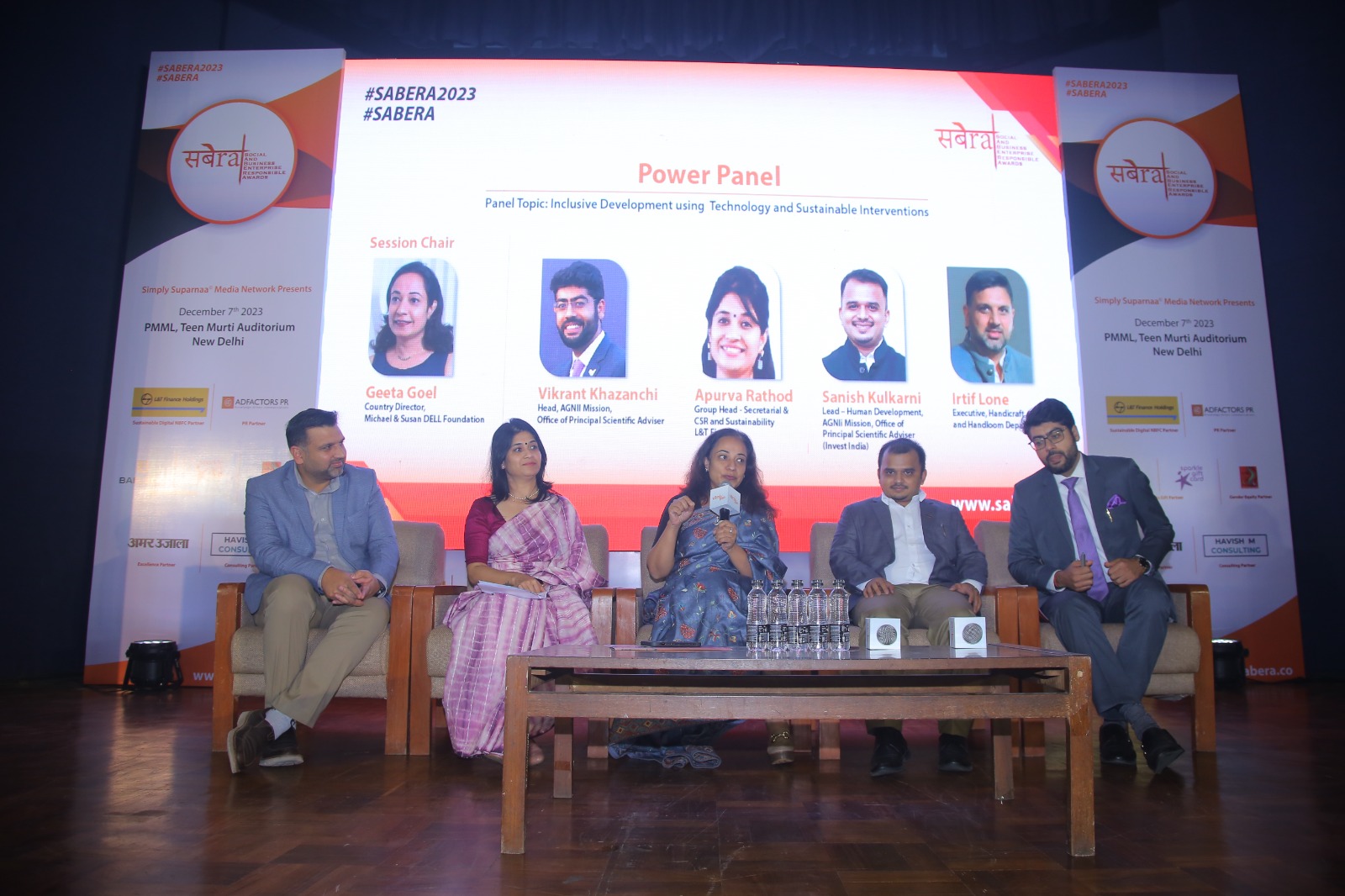Power Panel at SABERA 2023 Unveils Key Strategies
The power panel at SABERA 2023 brought together stakeholders from government, policy, industry, CSR, and the non-profit sector to discuss inclusive development for Atma Nirbhar Bharat, India’s initiative for self-reliance. The discussion focused on leveraging technology, collaboration, and policy to empower communities and individuals, particularly women and artisans.The discussion, moderated by Geeta Goel of the Michael & Susan Dell Foundation, delved into critical questions and offered inspiring examples of leveraging technology, collaboration, and policy to empower communities and individuals.
Empowering Women Through Financial Inclusion:
Apurva Rathod, L&T Finance Holdings Limited, shared their impactful micro-loan program that directly impacts rural women. Utilizing the “3S model” (Social impact, Scalability, Sustainability), they empower women with financial independence through micro-loans alongside digital and financial literacy training. Their “Digital Sakhi” program, implemented with NGO partners, equips women with digital tools and knowledge, transforming them into changemakers within their communities.
Beyond Loans: Education and Livelihood Development:
Geeta Goel emphasized the Michael & Susan Dell Foundation’s multifaceted approach, focusing on education as a foundation for lasting change, alongside immediate income generation through livelihood programs, and financial inclusion initiatives, particularly for women. Highlighting Chhaya’s keynote speech emphasizing women’s mainstreaming, Goel stressed that economic empowerment at the grassroots level leads to transformed communities.
Technology as an Enabler:
Vikrant Khazanchi, Head of Agnii Mission, showcased how this government initiative leverages science and technology for inclusive development. Agnii adopts a user-centric approach, conducting in-depth ethnographic research to ensure inclusivity and diversity in their projects. They also prioritize grounding themselves in reality, challenging assumptions and working directly with beneficiaries. One example highlighted the revival of Kashmiri handlooms, where learnings can be applied to craft communities across India.
Handicrafts and Innovation in Jammu & Kashmir:
Irtif Lone, Executive Manager of the Handicraft and Handloom Department in Jammu & Kashmir, shared their innovative approach to reviving the state’s neglected handicraft sector. By implementing the first-of-its-kind policy focusing on artisans, they tackled challenges like counterfeiting through GI tagging and blockchain-based QR codes ensuring product authenticity. Lone emphasized the importance of attracting the next generation to carry forward these traditions, highlighting how simple interventions like Namda rollers can significantly improve artisan lives.
Deep Impact Technology and Scaling Solutions:
Sanish Kulkarni, Lead, Human Development at the Office of Principal Scientific Advisor, introduced the concept of “deep impact technology,” focusing on user adoption and behavioral change. He cited Agnii’s portable soil testing kits for women farmers in Uttarakhand, empowering them to test their own land instead of relying on distant labs.
Balancing Depth and Breadth for Sustainable Change:
The discussion explored the tension between depth of impact and breadth of reach. While individual changemakers contribute to intergenerational impact, scaling education systems, for example, can systemically uplift entire communities. Sanish emphasized that Agnii prioritizes depth but scales solutions through partnerships and adaptable technologies.
Collaboration and Knowledge Sharing are Key:
Both Apurva Rathod and Sanish highlighted the importance of platforms like SABERA in facilitating collaboration and knowledge sharing. Rathod mentioned potential collaborations between L&T’s women entrepreneurs and Jammu & Kashmir’s startup platform, demonstrating the power of cross-sectoral networking.
Education and Digitization – Bridging the Gap:
Emphasizing the transformative potential of technology, Goel cited India’s unprecedented UPI payment system as an example. Vikrant echoed this sentiment, stating that Agnii aims to achieve both depth and policy-driven scale. They have contributed to drafting the Deep Tech Startup Policy and convene stakeholders to implement recommendations. Additionally, partnerships with government, non-profits, and CSR initiatives strengthen their reach and impact.
Key Highlights:
- L&T Finance Holdings Limited: Shared how their micro-loan program with digital and financial inclusion empowers rural women.
- Michael & Susan Dell Foundation: Emphasized the importance of education, livelihood, and financial inclusion for long-term change, especially for women.
- Agnii Mission: Showcased how their science & technology-based innovation tackles societal challenges, including handicraft revival in Jammu & Kashmir.
- Office of Principal Scientific Advisor: Highlighted the need for “deep impact technology” that focuses on user adoption and behavioral change.
- Collaboration and Amplification: Participants emphasized the importance of platforms like SABERA to facilitate collaboration, networking, and knowledge sharing.
Actionable Insights:
- Invest in technology solutions that are user-centric and promote inclusivity.
- Foster collaboration between government, industry, and the non-profit sector.
- Empower women through economic opportunities and financial literacy.
- Use policy to incentivize deep tech innovation and scale up successful solutions.
- Encourage knowledge sharing and amplify the voices of changemakers.


